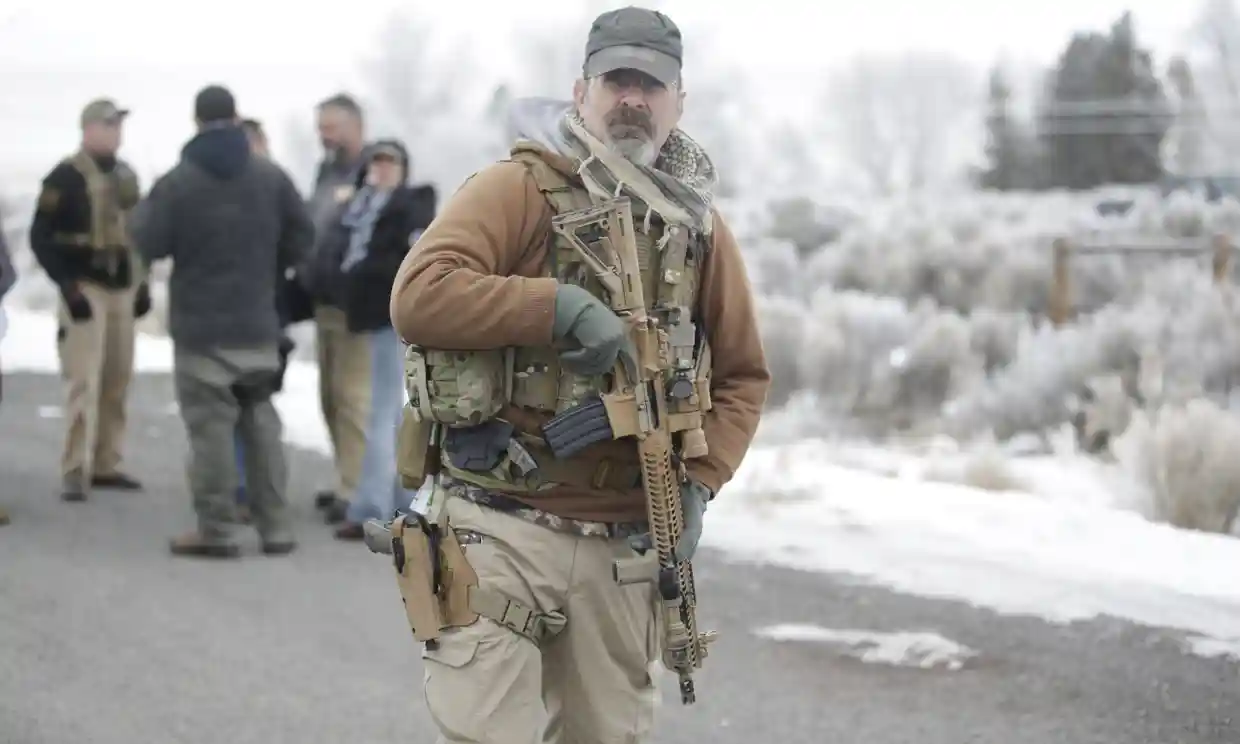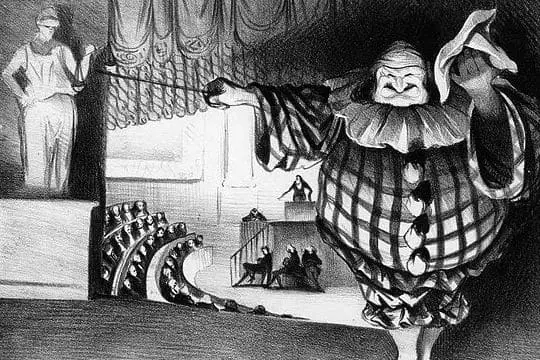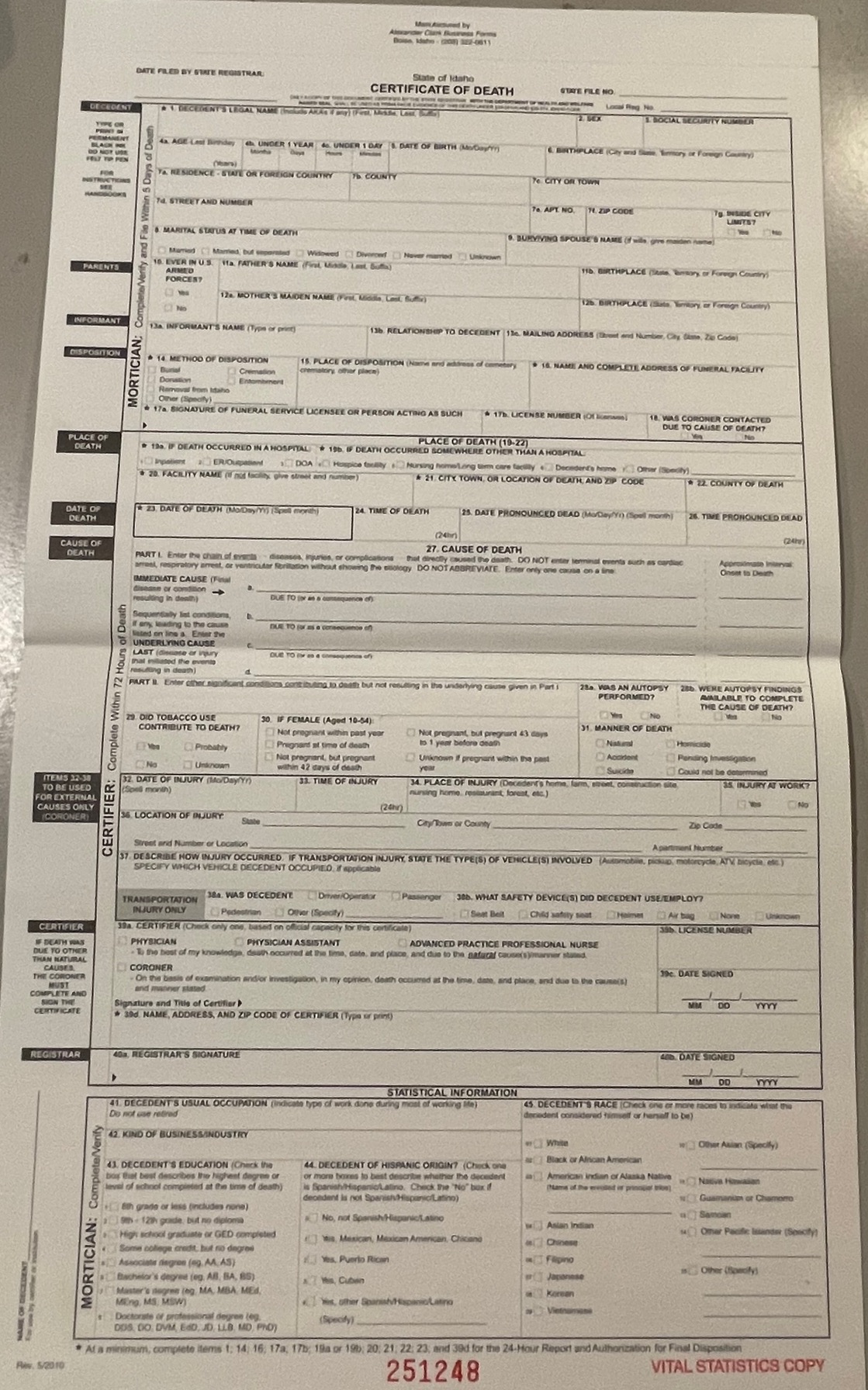
Sometimes how you get the call is an important part of the story. Sometimes, it’s who calls you, sometimes it why they thought you needed to be called, sometimes it why you weren’t called. All these little nuances to being a small town, rural county coroner fascinate me. So, when I picked up my phone on a warm fall afternoon and I got gruff old Ivan’s voice yelling into my ear, “Doc!?”, I didn’t expect this to be a coroner call.
“Yeah Ivan, what can I do for you?” He’s 85 years old, a crusty skin and bones old rancher in the east county. I see him maybe once a year as his doctor, less if he had his way. But the time I stuck him in the hospital with congestive failure and told him he wouldn’t make his 82nd birthday inspired him to come in annually after that, mainly to rub my nose in my errant prognosis.
I saw him more when his wife was dying. They cared for her at home right up to the end. She got demented and went fast, thank God. I’d met her three or four years earlier and while I was asking her about her family history, she looked me in the eye and told me a fractured but intelligible story of her brother, five years older, who’d gotten demented and died within a year.
“That old Alzheimer’s can really take you down,” she’d tsk’ed and shook her head. I nodded but silently disagreed. Alzheimer’s usually takes some one five years or more after the initial diagnosis. My mom had taken more than ten years. Usually, it’s plenty of time for families to flounder with personality changes, bed sores, diaper changes, nursing home costs and guilt. But Ivan’s Irene had just gotten pleasantly forgetful and died a year later. Her pattern, and her brothers made me fear I’d missed a diagnosis. None of this was on Ivan’s still sharp mind this fall Saturday afternoon.
“You still the coroner?” he yelled. His deafness made him yell. He was the deaf one, but he yelled to others out of politeness, I guess. “I know I voted for you once but maybe I missed something.”
“Yeah Ivan, I’m still the coroner. You fixing to die or something?”
“What?”
“How can I help you? Yes, I’m still the coroner.” That last part as loud as I could yell into the phone.
“Oh no, I’m not dead. At least I don’t think so.” He laughs. “Say, I got a dead guy for you.”
“Really?”
“Yup. Out on American Ridge. I was out looking to bring in some cows and found him.”
“You call the sheriff?”
“No. Should I? I don’t think he needs arresting, he’s dead.”
“Where are you now?”
“I’m back at the house. But he’s up on the ridge like I said.”
“OK Ivan. I’m going to call the sheriff’s office then we’ll come out to your house, and you can show us this guy.”
“When’ll it be?”
“Maybe an hour. Why?”
“I was gonna get something to eat.”
“You go right ahead. See you soon.”
I hadn’t wanted to suss out details, yelling into the phone and his hard of hearing. I knew Ivan was a solid guy and wouldn’t be calling me about some pile of deer bones or an old flannel jacket on a log. So, I called the sheriff’s office. I think this was the first and only time I ever called them about a dead body. They usually called me. But it can go all sorts of ways. One time the funeral home called the local police about a coroner case. An old guy had driven his ’63 Chevy truck into the funeral home parking lot, taped a note to the driver side window and shot himself behind the wheel. He was trying to save us all the hassle. But we all got rousted out anyway and then had to call to get his bloody truck towed away.
I got to Ivan’s house after the deputy. They have radios. The deputy and Ivan were up on the front porch. Though sunny, there was a fall chill and a westerly breeze that suggested rain. Hunting season was full bore, so my hunch was this body was a lost hunter. But usually Search and Rescue hears about such a thing before the guy’s feet get cold. He doesn’t come back to camp and the word goes out. Still, some guys go out by themselves, break a leg, who knows.
I climb the porch steps. “Hello Ivan. Hello Brandon.”
Ivan smiles. Brandon grins. “Did you take a wrong turn doc?” He knows I’m famous for getting lost on the county roads.
“No, I just had to put the tools away. I’m mudding some sheet rock.”
“Oh yeah. Don’t want that shit to dry on the tools.” He’s being familiar but I doubt he’s ever remodeled or fixed up even his single wide.
“So, what have we got?”
“Ivan here says it’s a plane wreck.”
“Really?” I’m surprised. I felt bad for not asking more over the phone. But in person is best with this old guy. I made him come in once a year at least for his medicine refills, though he only took one or two pills, way below average. He took great glee showing me he had beat my prognosis. I had to go over him pretty good, since he minimized everything. The 2-centimeter skin cancer on his right shoulder I’d found under the Carhart jacket, wool shirt and long underwear.
“Oh, that.” He’d said when I asked him about it. Plane wreck? Small potatoes, I guess.
Ivan was retelling Brandon about how he’d noticed all the broken trees across the canyon. I could figure this was a retelling since Brandon rolled his eyes at me. Somebody had to cut him off; we’re losing daylight.
“So, Ivan, can you get us to this wreck? I wore my boots. How far is it?”
He puckered to an expression of thought. “Well, what rig we gonna take?”
“Which one did you take?” I yell at Ivan.
Brandon interrupted. “You get the twenty doc. I’m gonna tell dispatch about the plane wreck thing.” He went to his rig and the radio.
Ivan’s grinning at me about his answer. “Well, doc, I was on Sadie.” He looked at me intently and waited.
“Who’s Sadie?” You gotta let them tell the joke.
“She’s my old mare!” He slaps his thigh.
Old brittle 85-year-old on horseback with congestive failure rubbing my doctor nose in it.
“So how can I get there?”
“You driving that thing?” He nods at my rusty old Toyota two-wheel drive pickup.
“I drove it here. We need four-wheel?”
“It’s a bit muddy past the gate.”
“We’ll take the deputy’s rig. It’s got four-wheel.”
Brandon said no one knew of any plane wrecks but dispatch was going to check with the FAA. We all got into the deputy’s Ford Explorer. I got to sit in the back where the doors don’t open from the inside, so Ivan managed the gates. They were his anyway.
It was about three in the afternoon now and it would be getting dark by 5:30 or 6. At least it wasn’t raining yet or snowing. We passed three wire gates then we get into broken timber. Ivan was telling Brandon how he’d come at it a different way on horseback so he’s not sure we can see it here from the dirt track. “Hell, Sadie saw it first!” he yells. “I’m looking for cows and she keeps staring off at the far ridge, so’s I think she’s seeing some there, but that’s when I saw the broken trees and the plane.”
“Did you go up to it?” Brandon asks.
“Naw, but I could see something in the pilot’s seat with the glasses. He’s dead.”
After twenty minutes and maybe five miles Ivan suggests we stop. By the rig he offers, “Just climb up this ridge and head south a bit.” He’s gesturing with gnarled hands and stiff shoulders. “We was up on this ridge I think when we seen it.” He twists back. “I could show you but I’m not too good in this downfall.” Another gimped up gesture and I’m looking for a path.
“If you’re staying here, I’ll leave the keys with you if you need to warm up.” Brandon handed the old man the keys.
We clambered over logs and through brush. I didn’t sense any ridge nor even magnetic direction. After thirty minutes we agreed to go back and get Ivan. “I seen you were dropping down too soon” he grinned.
There were the usual jokes about if anybody got hurt at least we had a doctor. And if it really went to shit, we had the coroner. I’ve heard them too many times. Ivan was remarkably agile, though slow and I’m thinking of daylight. He followed game trails and stayed with the grade until we came to a clearing.
“You might be able to see some broken trees from here off that a way.” He gestured again. Both Brandon and I looked off. It was a quarter mile or so below us still. The thing that got my attention was the fine white dusting across a couple hundred yards before the broken trees and white fuselage shined at us.
“Think it was a crop duster?” Brandon asks.
“Nope,” I say. “They don’t spray white powder.”
“OK Ivan, we can see it. Do you think you can get back up to the rig?”
“I think I better stay with you guys. You got pretty fouled up last time I sent you off. It ain’t far.”
We dipped back down into the timber following the old man. There was a temptation, like when you shoot a deer, to head off full bore to where you think it’s down. But long ago I learned that temptation is to be avoided. Slow and steady got Ivan to 85. By the looks of it he’ll make 90 at this rate.
The white powder I saw contrasting the dark needles wasn’t visible on the ground, but I warned Brandon. “Don’t touch the ground and put your fingers in your mouth. You won’t be passing any drug screens the sheriff puts you through.”
“Is it OK to breathe?” He chuckles.
“Only through your nose.”
The wreckage was mostly intact though both wings had sheared, and the fuselage buckled. We could see it was a twin-engine prop, no numbers on it. Ivan had stopped and was looking back. “I think I spotted her from up over there.” He gestures back toward a clearing across the canyon a couple hundred yards up and over; always orienting. “I could see the guy in the pilot’s seat. He’s dead. That’s why I called you.” He reminds us.
Brandon was ahead of us downhill looking into the tilted cabin, past the bent and split open fuselage. There were lots of wrapped bricks and white powder back here. He hustled up the slope a little breathless. “I gotta call this in. They’re gonna want to know about this. I’ll head back to my radio in the rig. Hope I can raise them here. If I can’t I’ll drive out a ways. You guys gonna be OK? I’ll be right back.” He was panting.
“Sure.”
“Take your time.” Ivan advised. “We’ll be fine.”
Brandon scoots up the sidehill back toward the Explorer. I walk down toward the cockpit. Ivan follows. It’s pretty quiet here in this canyon, no wind, but I can see it’s getting gray. We have another couple hours of light I figure.
The windows are all broken out and I can step into the tilted plane pretty easily with the left side torn open. Ivan was right, the pilot was very dead, not days, just pale and stiff. But it’s been cool, and this is a north slope, so maybe a couple days. No animals had gotten to him. There’s blood out both ears and the head is tilted at a funny angle.
I spook when “What do you think killed him doc?” is yelled in my ear. Ivan is all serious and frowning.
“Jesus, Ivan.” I want to tell him to soften his voice here in the presence of the dead, but I know it’s no use. “I think he died in a plane wreck.”
Ivan’s laughter is loud, and he laughs too long; my skin crawls a bit, I don’t know why. He gets serious and asks me intently, wanting to know. “No, I mean doc, did he bleed to death? I see some blood but not that much.”
“Oh, Ivan, it’s hard to tell. Here let me check.” I reach in and twist his head a bit and feel some grating bones. “Yeah, I think his neck is broken.” The yelling I have to do makes this almost obscene.
“But is that what killed him? People survive…” he trailed off as I turned my back to him. I wanted to get some identification. There were satchels that looked like luggage on the cabin floor and more stacked up where the copilot’s seat would have been. I zipped open a small one behind the pilot’s seat. There on top of rumpled clothes were three passports, one Columbian, one Mexican, one Peruvian. Miguel Sandoval was on the Mexican, Manuel Salinas was on the Peruvian and Miguel Santoro was on the Columbian. There were three other satchels jumbled next to him. I unzipped one. Bundles of US currency were neatly stacked and wrapped, some fifties, some twenties, some hundreds.
I jumped again when Ivan said, quieter this time, “Don’t know as I’d called you guys if I’d a known all that was there.”
Brandon got back in about a half hour. He looked troubled. “We’ll stay put ‘til they get here. Won’t be long.” For some reason I didn’t ask who. “Why don’t you take Ivan back up to the rig so he don’t have to scramble around if it gets dark.”
Ivan and I made the slow walk back to the Explorer, then I headed back down and across the slope, a little faster on my own.
When the big black helicopter came over just before dark and all the paramilitary dark suited guys came down the slope, I knew it wasn’t our sheriff’s department. A short man approached us with his combat weapon by his side as the others fanned out and disappeared in the gloom. He had night vision goggles up on his helmet, black clothes, black gloves and a smile. He didn’t offer his hand. He spoke to Brandon. “OK, we got it. You can take off.”
Brandon nodded and softly gestured to me as he turned up the slope. “Hey,” was my simple objection and the short man turned toward me.
“Who are you?” he shot at me.
“I’m the county coroner.”
His smirk didn’t feel so good. “You can go, sir. We got it.”
“And just who are you?”
Brandon was three or four steps up the slope. He stuck out a beckoning hand. “C’mon doc.” Like I’m a balky puppy. The short guy was getting ready to turn away again and I asserted all the authority a county coroner has. “What happens to the body?”
This time he wasn’t deferential. He snapped back toward me and up in the trees I could see a dark shape, maybe two, step into view. The short man looked me directly in the eyes. “You can go. We got this.”
Brandon was now stepping down the slope, impatient with me. “Come on doc. We’re going. These guys are taking over. They’ll take care of it. We gotta get back.” He put his hand on my shoulder, softly, not like he would have grabbed a puppy’s scruff, but like we were having beers. “C’mon.”
The trail back up was dark. I only slipped a couple times.
“You guys see that big black heelocopter?” Ivan asked. Brandon wouldn’t tell us nothing. Maybe he didn’t know.
It was about three weeks later I got a call from the medical examiner’s office in Spokane. “Dr. Hawthorne?”
“Yes, how can I help you?” I hadn’t requested their services for years.
“We have a body here and we need your permission to release it to the family.”
I’m clueless. “Who is it?”
“Manuel Sandoval”
“Why are you calling me? I don’t know this guy. It’s not my case.”
“Our paperwork says you are the coroner on this case, and we just need your permission to release the body.”
“So, are you sending me a death certificate; an autopsy report?”
“Uh, no. Those were sent to Washington. We just need your authorization to release the body.”
“Call Washington. I don’t know anything about this.”
“Uh, we did. They said to call you.”
“Is my name going to be on any record of this?”
There was a pause. “No sir. We just need your permission to release the body.”
Deep sigh. I thought of Ivan’s smile and his slow steady gait. How he looked the graceful scarecrow under the dark pine canopy weaving through the brush and sticks. I thought how he would laugh at this silly joke. I wanted to be sitting on his porch in the afternoon sun, telling him this story, yelling him this story, repeating myself when he said “eh?” and finally getting tired of the whole tale, realizing it’s not a short joke but a long one with nothing really to laugh at. But then we’d just sit there and look at the sun on the hills from his old farmhouse.
“You have my permission to release the body.”
No death certificate filed.



